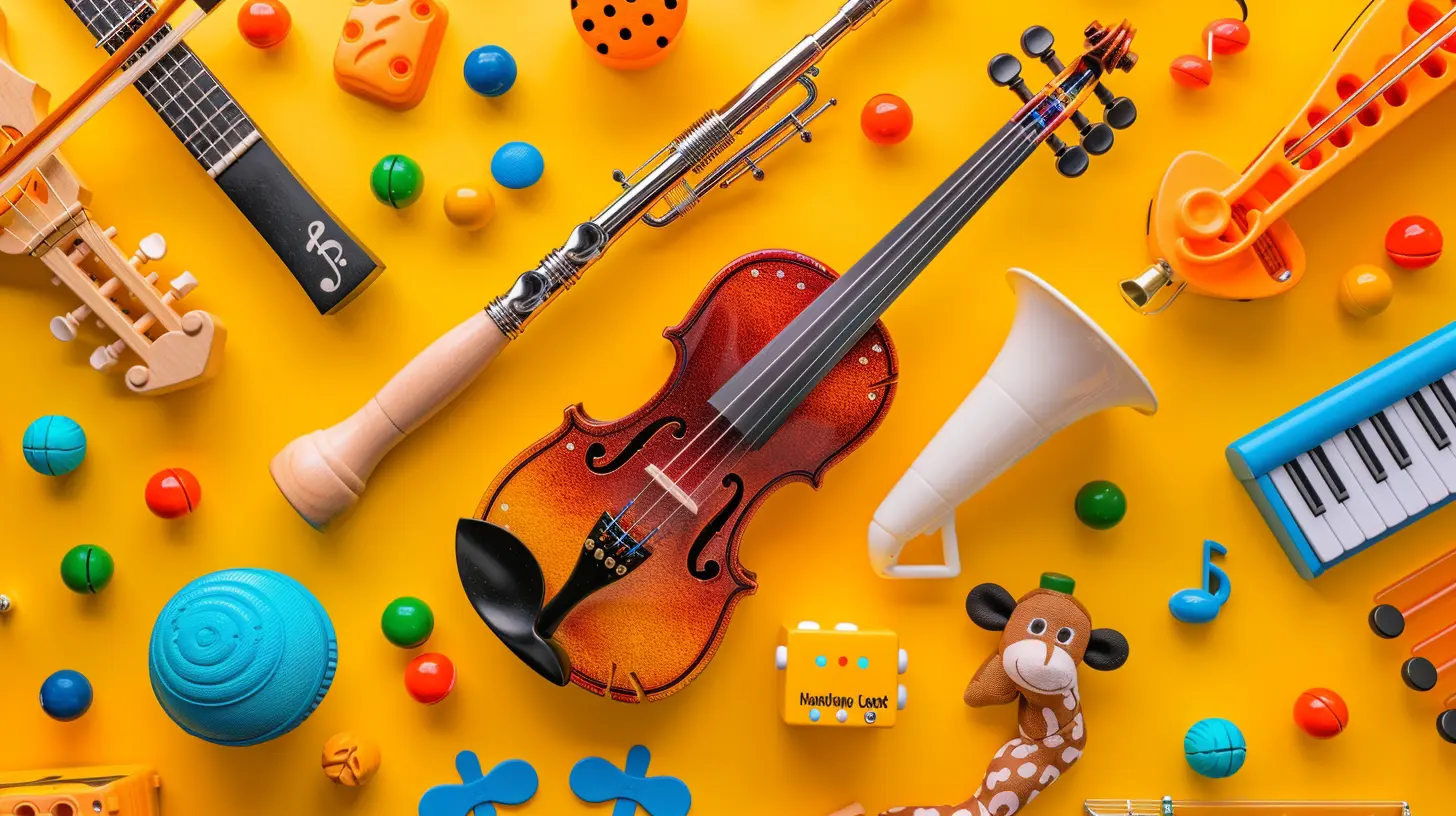How to Make Music Practice Fun and Engaging
2 July 2025
Practicing music can sometimes feel like a chore, right? Whether you're learning a new instrument or trying to master a piece, it's easy to get bogged down by the repetition and technicalities. But here's the thing—music practice doesn't have to be boring. In fact, it can be downright fun and engaging if you approach it the right way! In this article, we'll explore how to turn your music practice sessions into something you actually look forward to.
So, grab your instrument (or warm up those vocal cords!) and let's dive into some creative techniques to make your music practice more enjoyable.

Why Is Music Practice Important?
Before we get into the fun stuff, let's quickly address why regular practice is crucial. Practicing isn't just about getting better at playing an instrument; it's about building muscle memory, improving your ear for music, and developing a deeper connection with the pieces you’re working on. The better you understand and feel the music, the more expressive and confident you’ll become when performing.But let's be real—it's hard to stay motivated when practice feels like a grind. This is exactly why it's important to make your sessions enjoyable and engaging. When you're having fun, time flies, and before you know it, you've made real progress!

1. Set Clear, Attainable Goals
If you’ve ever tried to run a marathon without training, you know how overwhelming it can be. The same goes for music practice. If you’re just sitting down to your instrument without any direction, it’s easy to feel lost or unmotivated.Setting clear, attainable goals can help combat this. Whether it's mastering a difficult passage, improving your speed, or even just learning a new song, having a specific focus for each practice session makes it more purposeful.
Break your goals down into bite-sized chunks. For example, instead of saying, "I want to learn this entire sonata," you could say, "Today, I'm going to focus on playing the first page with no mistakes." This not only makes the task more manageable but also gives you a sense of accomplishment when you've completed it.
Pro Tip: Keep a Practice Journal
Jot down your goals and track your progress in a practice journal. It’s a great way to see how far you’ve come, and it’ll keep you motivated to push further.
2. Mix Things Up with Different Techniques
If you do the same thing every time you practice, it’s probably getting stale. A great way to keep things interesting is by mixing up your practice techniques. For example, if you're working on a piece, try playing it at different tempos—start slow and gradually speed up. Or, reverse it and start fast, then slow it down to really focus on tricky sections.Another fun technique is to break music into small sections and practice each one in isolation. Not only does this prevent overwhelm, but it also allows you to focus on mastering the smaller details before putting everything together.
Try Using Rhythmic Variations
For those working on technical exercises, changing the rhythm can be a game-changer. Instead of playing straight eighth notes, try playing them as dotted rhythms or triplets. This makes the practice feel fresh and forces your brain to engage differently.
3. Use Apps and Tools to Spice It Up
Did you know there are tons of apps and digital tools designed to make music practice more engaging? From tuning apps to rhythm trainers and even video games that teach music theory, the possibilities are endless.Popular Music Apps to Check Out:
- Yousician: This app turns music practice into a game by offering real-time feedback as you play along with popular songs.- TonalEnergy Tuner: A tuner and metronome all-in-one that lets you track your progress on intonation and rhythm.
- Soundbrenner: A wearable metronome that vibrates in time with the beat, so you can feel the rhythm as you play.
Incorporating technology into your practice routine can make it feel less like a chore and more like an interactive experience.
4. Make It Social
Music is meant to be shared! If you’re always practicing alone, it’s no wonder you might lose some enthusiasm. Consider finding a practice buddy or joining a music group. Even if you don’t live near other musicians, there are plenty of online communities where you can connect with fellow music enthusiasts.Benefits of Practicing with Others:
- Accountability: When you know you’re going to meet up with someone to practice, you’re more likely to stay committed.- Inspiration: Seeing someone else’s progress can inspire you to push through your own challenges.
- Fun: Let’s be honest—playing music with others is just plain fun! Whether it’s jamming with friends or collaborating on a duet, making music together adds a whole new layer of enjoyment.
If you’re not ready for group performances, consider simply recording yourself and sharing it with friends or family. Getting feedback and encouragement can be a huge motivator.
5. Reward Yourself
Who doesn’t love a reward? Incorporating a reward system into your practice routine can make the whole experience more enjoyable. For example, after you’ve completed 30 minutes of focused practice, treat yourself to something small—a snack, an episode of your favorite TV show, or even a quick scroll through social media.You could also set bigger rewards for hitting major milestones. Maybe after mastering a particularly difficult piece, you treat yourself to a concert or a new piece of sheet music. The key is to make sure the rewards are things that truly motivate you.
Gamify Your Practice
Ever notice how people can spend hours playing video games without getting bored? Games are designed to keep you engaged by offering small, consistent rewards. You can apply the same concept to your music practice. Use apps that track your progress and give you "badges" or "points" for completing tasks. You can even create a points system for yourself!6. Incorporate Music You Love
This one seems obvious, but it’s worth mentioning: Play music you actually enjoy! If you’re always practicing classical pieces but you love rock or pop, incorporate some of your favorite tunes into your practice sessions.Even if your teacher has assigned you a more traditional piece, there’s no rule that says you can’t spend some time working on something you love. In fact, learning music you’re passionate about will likely make you more enthusiastic about practicing in general.
Play Along with Your Favorite Songs
One great way to make practice more engaging is by playing along with your favorite recordings. Whether you’re jamming with a rock band or playing a solo piano version of a pop song, practicing with music you love can make time fly.
7. Use Visualization Techniques
Visualization is a powerful tool often used by professional musicians and athletes. Before you even touch your instrument, try mentally rehearsing the music. Visualize yourself playing the piece perfectly—your fingers moving effortlessly, the sound resonating beautifully. This not only helps prepare your brain for practice but also boosts your confidence.How to Use Visualization in Practice:
- Close your eyes and imagine yourself playing through the piece.- Focus on the details—how your hands or body move, the sound of each note.
- Visualize yourself overcoming difficult sections with ease.
When you finally pick up your instrument, you might be amazed at how much smoother your practice goes.
8. Create a Relaxing Environment
Your practice environment plays a huge role in how enjoyable your sessions are. If your practice space is cluttered, dimly lit, or uncomfortable, it’s no wonder you're not eager to practice.Tips for Creating a Positive Practice Space:
- Lighting: Make sure your space is well-lit, preferably with natural light.- Comfort: Choose a comfortable chair or bench. If you’re standing, make sure you have room to move.
- Ambiance: Add a personal touch—maybe some plants, posters, or a cozy rug. Make it a space you want to spend time in.
The more inviting your practice space is, the more likely you are to enjoy spending time there.
9. Take Breaks and Listen to Your Body
While it’s important to practice consistently, it’s equally important to listen to your body and take breaks. Over-practicing can lead to burnout, frustration, and even physical injury. Instead of pushing through fatigue or boredom, step away for a few minutes. Stretch, grab a drink of water, or just take a few deep breaths.The Pomodoro Technique for Music Practice
The Pomodoro Technique is a time management method where you work for 25 minutes, then take a 5-minute break. After four cycles, take a longer break (15-30 minutes). This technique can help you stay focused during practice while also giving your brain and body the rest they need.Conclusion
Music practice doesn’t have to be a grind. With a little creativity and some simple strategies, you can turn it into something you truly enjoy. Whether it's setting clear goals, using fun apps, playing the music you love, or making it social, there are plenty of ways to make your practice sessions both productive and fun. So go ahead—mix it up, experiment, and most importantly, enjoy the process of becoming a better musician.all images in this post were generated using AI tools
Category:
Music EducationAuthor:

Eva Barker
Discussion
rate this article
1 comments
Annette McGinn
Thank you for this insightful article! Your tips on making music practice enjoyable are both practical and inspiring. Incorporating fun elements into practice routines is essential for fostering a lifelong love of music. I look forward to implementing these strategies in my own practice sessions. Great work!
July 12, 2025 at 10:35 AM

Eva Barker
Thank you for your kind words! I'm glad you found the tips helpful and inspiring. Enjoy your practice sessions!


